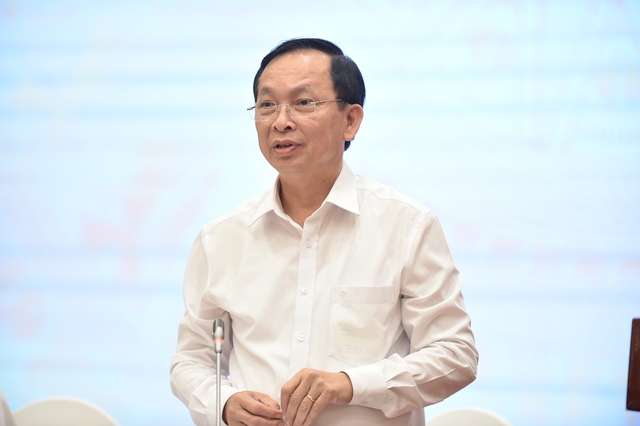Central bank considers expanding credit quota for well-run banks
In the past months, the fact that many banks have seen their quota reaching the limits makes it hard for people and businesses to access loans.
The State Bank of Vietnam (SBV) would expand the credit quota for well-run banks in the next one or two days, as most have run out of their credit rooms assigned since the beginning of the year.
| SBV Vice Governor Dao Minh Tu at the press briefing. Source: VGP |
SBV Vice Governor Dao Minh Tu revealed this at the Government’s monthly press briefing on September 6.
For this year, the SBV set a credit growth target of 14%, similar to the rate from last year. However, Vietnam’s credit growth as of the end of August was estimated at 9.91%.
“This is significantly higher than that of in the same period last year, and banks have reached their now maximum allowed credit growth rate,” Tu said.
For the remaining credit quota of over 4%, Tu expected the SBV would allocate the room for banks within the next few days.
“Banks with good financial situation and positive capital adequacy ratio (CAR) would soon be permitted to extend credit growth,” Tu said.
In the past months, the fact that many banks have seen their quota reaching the limits makes it hard for people and businesses to access loans.
The credit quota allocation for banks is based on a set of criteria stipulated in Circular No.52, including capital, asset quality, corporate governance, business performance, liquidity, and sensitivity to market risks.
SBV’s evaluation scores, however, are not public knowledge but are kept secret between the central bank and the lender.
Tu said the inflationary pressure has been subdued in the past months due to declining prices of oil and gas, but noted the central bank would continue to stay cautious in managing monetary and interest rate policies to deal with inflation risks.
“The objective is to ensure the containment of inflation and support economic growth, which requires flexible management of monetary and fiscal policies," he continued.
At present, the average interest rates at commercial banks are around 7.9-9.5% per annum; and 6.3-6.8% for the deposit interest rates which Tu said are reasonable at the moment.
Several banks have recently raised their deposit rate by up to 1% per annum for the first time this year.
SSI Research suggested banks may further raise the capital mobilization rate during the remaining period of the year, in case the SBV expand their credit quotas.
“The rate is forecast to be around 50-70 percentage points, leading to interest rates rising by 1-1.5% for this year,” noted the SSI.
Meanwhile, HSBC’s report predicted Vietnam’s 2022 inflation to average 3.5%, below the SBV’s 4% inflation ceiling, but noting price pressures will become stronger in the second half of the year.
Based on its inflation forecasts, inflation will likely overshoot 4% from the fourth quarter of 2022 to the second quarter of 2023, increasingly calling for the SBV to start its monetary normalization, HSBC suggested.












